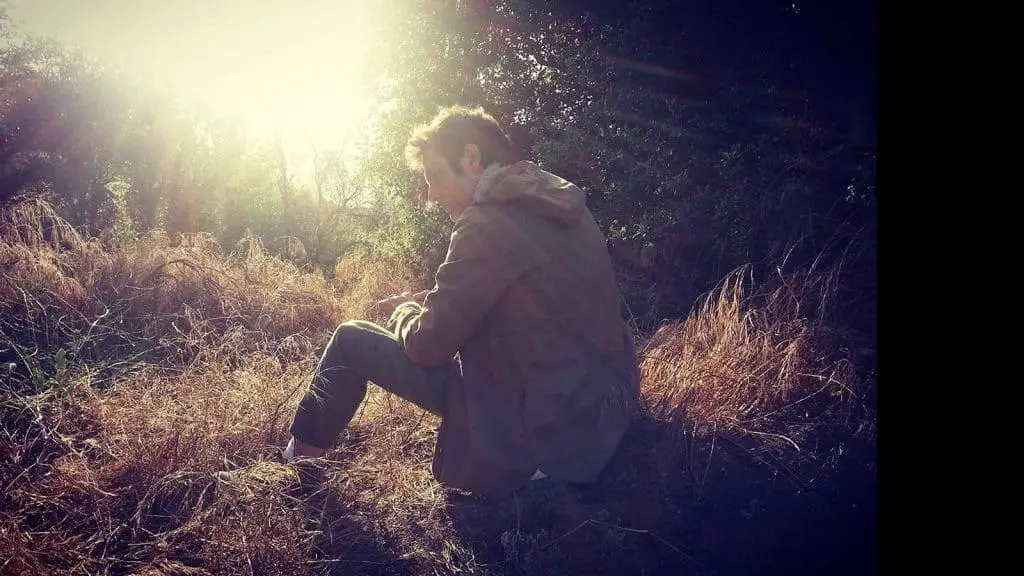
It’s just a few days before the tragic events of 9/11 and the only sound that can be heard on the street is a ringing phone. There’s a dirty phone booth on the other side of the street with a man trapped inside. Phone booths might be nearing extinction, but in the hands of Larry Cohen, the legendary writer-director of such films as “It’s Alive!”, “Q”, and “The Stuff,” the phone can be an object of pure horror. Just ask Stuart Shepard (Colin Farrell), the doomed hero of Cohen’s upcoming horror-thriller Phone Booth. Cohen’s also written “Cellular,” another phone thriller, which is scheduled for release in 2004. Who’s the man on the phone? Why the obsession with phones, Larry Cohen? According to Cohen, the very minimalist natures of “Cellular” and Phone Booth presented an exciting test for the veteran writer-director and a relief from the superficial Hollywood product that he’s sick of watching. There’s a reason why the man in the phone booth looks so scared: phones can kill.
“I haven’t made a film in a few years,” says Cohen, referring to his last directorial effort, 1996’s “Original Gangstas.” “One of the reasons is that I’m sick and tired of the garbage that’s out there. Nothing but explosions, everything huge, but no story. That’s when I started thinking about ‘Cellular’ and Phone Booth. I decided I was going to sit down and write something that’s the complete antithesis of stuff like Armageddon, a totally minimalist type story like ‘Rear Window,’ which is one of my favorite thrillers, and a big inspiration for ‘Cellular’ and Phone Booth. I wanted to pick the tiniest setting possible and I started with the phone booth.”
From there, Cohen sat down and hammered out the now famous Phone Booth script in just a week, with just a couple of days more spent on polishing it. When he was done, Cohen knew he had a script that cooked. “It did cook,” Cohen explains. “It was so tight and suspenseful. Other people agreed and somehow the big agency CAA got a copy of the script. They loved it and called me. It’s a very good sign when a big agency calls you. A few weeks later, the script was sold to Fox for big bucks.”
Phone Booth tells the story of Stuart Shepard, a stressed out, down-on-his-luck New York publicist, who walks into a phone booth, a regular habit, to arrange a romantic meeting with his mistress. Unbeknownst to Stuart, he’s been under surveillance for weeks, by an unseen figure, an armed psycho named The Caller, played by the voice of Kiefer Sutherland, who watches his every move. When the phone rings, Stuart, like most nosey people, picks it up and gets a most terrifying message: The Caller tells him that he’s being watched at gunpoint, and that if he puts down the phone or tries to leave the phone booth in any way, he’ll get his brains blown out.
“People don’t use phone booths anymore, so I had to find a way to get Stuart into the phone booth,” explains Cohen. “Of course, Stuart has a cellular phone; he’s a publicist, but he’s also having an affair and his wife checks all the phone records because she’s suspicious, so that’s why he always uses the phone booth.” As for Stuart’s dilemma, Cohen says, “Stuart is a publicist, but he’s kind of a bottom feeder, on the come as they say, living on a halfhearted handshake and a dream. Stuart was very much inspired by the Tony Curtis character from ‘Sweet Smell of Success.’ You know, he’s got small time clients and the big irony in the story is that Stuart is desperate for fame, attention for him and his clients. As it turns out, he becomes, arguably, the most famous man in New York City.”
Having a great concept like the one in Phone Booth is one thing, but telling a full story is another. For Cohen, the biggest difficulty, and the biggest joy, was creating the twists and turns and scary riffs that he expects will surely terrify audiences. “Oh yeah,” Cohen explains, “I write every single day. It’s fun, and in writing this script I really didn’t have a clear plan or outline. I didn’t know where I was going, so I just kept writing, making it up as I went along, just creating suspense and terror. It was sort of like jazz with the story riffs, just one after the other. I had a blast writing the script and I knew it was special.”
Cohen kept his creative juices flowing with his next effort, the script for the dark thriller “Cellular,” another don’t-answer-the-phone type thriller. “Yeah, I really felt like I was in a groove after I wrote Phone Booth and the awesome reaction the script got,” says Cohen. “‘Cellular’ is even more tense and this time it all has to do with this guy who has this cellular phone. He’s a college kid and one of his professors has let him stay at his house while he’s away, along with letting him use his car and, of course, his phone. The kid, Ryan Ackerman, gets a terrifying phone call from this woman, who says that she’s been kidnapped by a bunch of psychos and that she desperately needs help. So the kid has to chase around looking for her and no one believes his story and it’s just a nightmare. I even made it so the batteries on the woman’s phone are dead.” “Cellular,” which is scheduled to start filming in 2003, was to be the directorial debut of writer-producer Dean Devlin of “Independence Day” and “Stargate” fame, but Devlin eventually dropped out and Final Destination 2 director David Ellis is now slated to direct the film.
The interview continues in part two of LARRY COHEN: MAN IN A PHONE BOOTH>>>
